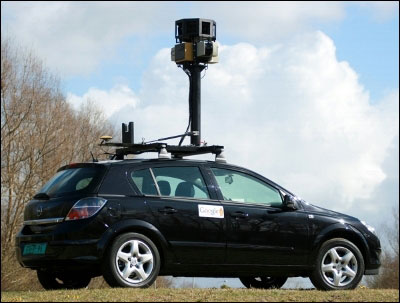Consumer Groups Slate Google’s Tiny Wi-Spy Fine

Google’s $25,000 FCC fine for “hypocritical” obstruction is small change, say critics
Consumer groups have criticised the small fne handed down to search giant Google, for impeding an investigation by the US Federal Communications Commission (FCC) into its collection of personal data by Street View cars.
The $25,000 FCC fine is “chump change” for Google, which made $3.4 billion (£2.1bn) on revenues of $10.65 billion during the first three months of 2012, according to Consumer Watchdog, which labeled the search firm as a hypocrite for wanting others to share their data, but obstructing the FCC’s probe. Despite the low fine, the FCC didn’t hold back on the sarcasm, commenting in its 25 pqage report: “Although a world leader in search capability, Google took the position that searching its employees’ email ‘would be a time consuming and burdensome task’
Not enough data
Google’s Street View mapping cars inadvertently collected private Wi-Fi data from 2007 to 2010, when the issue came to light. The firm then spent months in damage limitation, avoiding serious fines.
However, the Federal Communications Commission found that Google “deliberately impeded and delayed” its investigation by refusing to provide information and documents requested as part of the investigation.In addition, because an unnamed Google engineer who created the software that collected the Wi-Fi data declined to testify at a deposition – invoking his Fifth Amendment right against self-incrimination – as he was subpoenaed to, the FCC said it didn’t have the necessary information to decide whether Google had violated any laws.
 From 2007 through 2010, Google’s vehicles travelled through dozens of countries collecting data as part of its Street View project, which gives users of Google Maps and Google Earth the ability to see street-level images of locations. As part of that project, the cars also collected Wi-Fi data to gain information that Google could use to develop location-based services.
From 2007 through 2010, Google’s vehicles travelled through dozens of countries collecting data as part of its Street View project, which gives users of Google Maps and Google Earth the ability to see street-level images of locations. As part of that project, the cars also collected Wi-Fi data to gain information that Google could use to develop location-based services.
However, at the same time, the software was collecting what the FCC called “payload data” – sensitive and private consumer and business information such as Internet messages, emails, texts, passwords and Internet use history. Google officials in early 2010 initially denied that such information was collected, then said that some samples of data had been inadvertently collected.
It wasn’t until October 2010 that executives admitted that such information had been collected in more than 30 countries over the three years, and included whole emails, passwords and web browsing information.
‘Inadvertent’
Google officials said the collecting of the sensitive data was inadvertent, that it never used the collected information and that the information had been deleted.
It was after this that the FCC’s Enforcement Bureau began investigating whether Google had violated any commission rules. Around the same time, the Federal Trade Commission, which began its own investigation in the summer of 2010, decided in October 2010 not to take any action.
Some other countries – including Canada, France and the Netherlands – have ruled that Google’s data collection violated their privacy laws, and state attorney generals in dozens of US states are still conducting their own investigations.
FCC officials in their filing said that over nine months, Google executives continuously failed to supply the information and documents – including internal emails – that were requested, or the identities of many of the Google employees involved in the data-collection work, resulting in the $25,000 fine.
In a statement, Google officials said they disagreed with the FCC’s characterisation of their cooperation.
“As the FCC notes in their report, we provided all the materials the regulators felt they needed to conclude their investigation, and we were not found to have violated any laws,” the Google officials said.
They promised to file a response with the commission.
Consumer advocates respond
Some consumer advocacy groups railed against the $25,000 and the FCC’s decision to issue a heavily redacted finding.
John Simpson, director of the Privacy Project at the Consumer Watchdog group, said he was pleased the FCC derided Google “for its blatantly obstructionist violations, but $25,000 is chump change to an Internet giant like Google. By willfully violating the Commission’s orders, Google has managed to continue to hide the truth about Wi-Spy. Google wants everyone else’s information to be accessible, but in a demonstration of remarkable hypocrisy, stonewalls and keeps everything about itself secret.”
Simpson also said, “Google’s claim that its intrusive behaviour was by ‘mistake’ stretches all credulity. In fact, Google has demonstrated a history of pushing the envelope and then apologising when its overreach is discovered. Willfully obstructing a federal investigation shows Google has something to hide. Given its recent record of privacy abuses, there is absolutely no reason to trust anything the Internet giant claims about its data-collection policies.”
Do you know Google’s secrets? To find out, take our quiz.